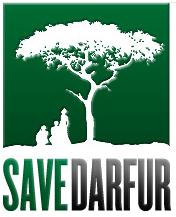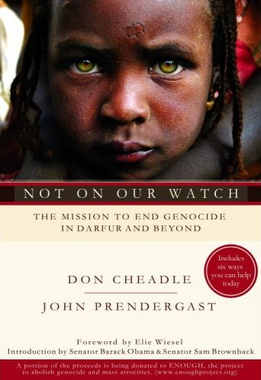
Darfur is a region of western Sudan. Dār is an Arabic word meaning "home [of]" – the region was named Dardaju while ruled by the Daju, who migrated from Meroë c. 350 AD, and it was renamed Dartunjur when the Tunjur ruled the area. Darfur was an independent sultanate for several hundred years until 1874, when it fell to the Sudanese warlord Rabih az-Zubayr. The region was later invaded and incorporated into Sudan by Anglo-Egyptian forces in 1916. As an administrative region, Darfur is divided into five federal states: Central Darfur, East Darfur, North Darfur, South Darfur and West Darfur. Because of the War in Darfur between Sudanese government forces and the indigenous population, the region has been in a state of humanitarian emergency and genocide since 2003. The factors include religious and ethnic rivalry, and the rivalry between farmers and herders.
The Janjaweed are an Arab nomad militia group from the Sahel region that operates in Sudan, particularly in Darfur, and eastern Chad. They have also been speculated to be active in Yemen. According to the United Nations definition, Janjaweed membership consists of Arab nomad tribes from the Sahel, the core of whom are Abbala Arabs, traditionally employed in camel herding, with significant recruitment from the Baggara.

The War in Darfur, also nicknamed the Land Cruiser War, was a major armed conflict in the Darfur region of Sudan that began in February 2003 when the Sudan Liberation Movement (SLM) and the Justice and Equality Movement (JEM) rebel groups began fighting against the government of Sudan, which they accused of oppressing Darfur's non-Arab population. The government responded to attacks by carrying out a campaign of ethnic cleansing against Darfur's non-Arabs. This resulted in the death of hundreds of thousands of civilians and the indictment of Sudan's president, Omar al-Bashir, for genocide, war crimes, and crimes against humanity by the International Criminal Court.
The Government of Sudan is the federal provisional government created by the Constitution of Sudan having executive, parliamentary, and the judicial branches. Previously, a president was head of state, head of government, and commander-in-chief of the Sudanese Armed Forces in a de jure multi-party system. Legislative power was officially vested in both the government and in the two houses – the National Assembly (lower) and the Council of States (upper) – of the bicameral National Legislature. The judiciary is independent and obtained by the Constitutional Court. However, following the Second Sudanese Civil War and the still ongoing genocide in Darfur, Sudan was widely recognized as a totalitarian state where all effective political power was held by President Omar al-Bashir and his National Congress Party (NCP). However, al-Bashir and the NCP were ousted in a military coup on April 11, 2019. The government of Sudan was then led by the Transitional Military Council (TMC). On 20 August 2019, the TMC dissolved giving its authority over to the Transitional Sovereignty Council, who were planned to govern for 39 months until 2022, in the process of transitioning to democracy. However, the Sovereignty Council and the Sudanese government were dissolved in October 2021.

The Save Darfur Coalition was an advocacy group that attempted "to raise public awareness and mobilize a massive response to the atrocities in Sudan's western region of Darfur." Headquartered in Washington, D.C., it was a coalition of more than 190 religious, political, and human rights organizations organized to campaign for a response to the atrocities of the War in Darfur, which culminated in a humanitarian crisis. By 2013, reports indicated that the conflict had claimed approximately 300,000 lives and had displaced over 2.5 million people.

This is the bibliography and reference section for the Darfur conflict series. External links to reports, news articles and other sources of information may also be found below.

While there is a consensus in the international community that ethnic groups have been targeted in Darfur and that crimes against humanity have therefore occurred, there has been debate in some quarters about whether genocide has taken place there. In May 2006, the International Commission of Inquiry on Darfur organized by United Nations "concluded that the Government of the Sudan has not pursued a policy of genocide ... [though] international offences such as the crimes against humanity and war crimes that have been committed in Darfur may be more serious and heinous than genocide." Eric Reeves, a researcher and frequent commentator on Darfur, has questioned the methodology of the commission's report.
Alexander William Lowndes de Waal, a British researcher on African elite politics, is the executive director of the World Peace Foundation at the Fletcher School of Law and Diplomacy at Tufts University. Previously, he was a fellow of the Harvard Humanitarian Initiative at Harvard University, as well as program director at the Social Science Research Council on AIDS in New York City.

Elliot J. Schrage is an American lawyer and business executive. Until June 2018, he was vice president of global communications, marketing, and public policy at Facebook, where he directed the company's government affairs and public relations efforts. He then served as vice president of special projects at Facebook.

Not On Our Watch: The Mission to End Genocide in Darfur and Beyond is a non-fiction book co-authored by actor Don Cheadle and human rights activist and co-founder of the Enough Project, John Prendergast.
Justice Africa is a non-governmental organisation which seeks to promote social justice and human rights in Africa. It was established in 1999, to ensure that the vision of a Pan-African civil society came to fruition. Justice Africa’s programmes are guided by the slogan: “nothing for us, without us”.
Day for Darfur is an international advocacy campaign that works to bring together activists in cities around the globe in calling for action on the crisis in Darfur, western Sudan.
Sudan Sunrise, Inc. is an American nonprofit 501(c)(3) organization based out of Fairfax, Virginia. According to their mission statement, Sudan Sunrise strives for grassroots reconciliation, education and community building in order to lift up examples of peace and forgiveness between former enemies as alternatives to the history of violence in Sudan and South Sudan. Sudan Sunrise also facilitates local efforts in Southern Sudan to provide education, health care and community development.
The Enough Project is a Washington, D.C.-based non-profit organization that was founded in 2007. Its stated mission is to end genocide and crimes against humanity. The Enough Project conducts research in several conflict areas in Africa including Sudan, South Sudan, the Democratic Republic of the Congo, the Central African Republic, and the areas controlled by the Lord's Resistance Army (LRA). The Enough Project seeks to build leverage against the perpetrators and facilitators of atrocities and corruption through conducting research, engaging with governments and the private sector on policy solutions, and mobilizing public campaigns. Campaigns and initiatives aimed to bring attention to these crises include The Sentry and, previously, Raise Hope for Congo and the Satellite Sentinel Project.

Sudan–United Kingdom relations are foreign relations between Sudan and the United Kingdom. Sudan has an embassy in London whilst the United Kingdom has an embassy in Khartoum. Most of the recent relations between the two countries centre on the region of Darfur.

John Prendergast is an American human rights and anti-corruption activist as well as an author. He is the co-founder of The Sentry, an investigative and policy organization that seeks to disable multinational predatory networks that benefit from violent conflict, repression, and kleptocracy. Prendergast was the founding director of the Enough Project and was formerly director for African affairs at the National Security Council.

The Eastern Congo Initiative (ECI) is an American nonprofit organization established by Ben Affleck and Whitney Williams in 2010 as "the first U.S.-based advocacy and grant-making initiative wholly focused on working with and for the people of eastern Congo". ECI provides development grants and international advocacy for community-building initiatives in the Democratic Republic of Congo.

The Enough Moment: Fighting to End Africa's Worst Human Rights Crimes is the second book co-authored by actor Don Cheadle, and co-founder of the Enough Project and human rights activist, John Prendergast. Cheadle and Prendergast's first book, Not On Our Watch: The Mission to End Genocide in Darfur and Beyond, was published in 2007.

Lee Bycel is an American Reform rabbi, rabbinic educator and social activist. He served as dean of the Hebrew Union College-Jewish Institute of Religion in Los Angeles for 15 years, as western regional executive director of American Jewish World Service, and, in 2017, retired from Congregation Beth Shalom of the Napa Valley. He is an adjunct professor of Jewish Studies & Social Justice with the Swig Program in Jewish Studies and Social Justice at the University of San Francisco.

The Darfur genocide was the systematic killing of ethnic Darfuri people during the War in Darfur. The genocide, which was carried out against the Fur, Masalit and Zaghawa ethnic groups, led the International Criminal Court (ICC) to indict several people for crimes against humanity, rape, forced transfer and torture. An estimated 200,000 people were killed between 2003 and 2005.












